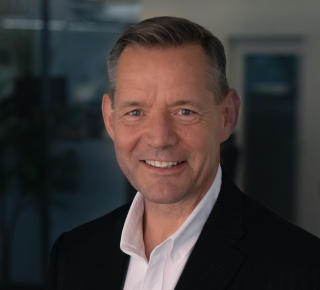MassTLC’s award-winning Board-Ready Bootcamp is designed to improve the quality of board governance and composition at tech companies by preparing underrepresented tech leaders, including African American, Latinx, LGBTQ, and women, to serve on tech boards.
Over the course of several weeks, participants – who must be current tech executives nominated to attend – receive high-impact training on board fundamentals, strategy, and governance in a small group setting, all while having the opportunity to network with top tech leaders in the region.
Board-Ready Bootcamp
Board-Ready Bootcamp is now accepting applications for the Fall 2021 cohort. It’s truly a personalized and transformational experience, and the best way to understand what makes the program special is to hear from the alumni themselves in their own words.
 Today, meet Aravinda Rao Souza, Vice President of Global Communications at Bullhorn, who has served technology companies around the world, including Dassault Systemes, SAS DataFlux, and QuickPlay Media, in high-tech agency public relations.
Today, meet Aravinda Rao Souza, Vice President of Global Communications at Bullhorn, who has served technology companies around the world, including Dassault Systemes, SAS DataFlux, and QuickPlay Media, in high-tech agency public relations.
Since participating in the April 2021 Board-Ready Bootcamp cohort, Souza has joined the board of Beth Israel Deaconess Medical Center in Boston. Here she shares her board journey, her thoughts on board diversity, her advice for getting stared, and more.
Read on for her story.
___
Why did you decide to participate in Board-Ready Boot Camp? What is the story of your board journey?
When I applied for the MassTLC Board-Ready Boot Camp, I had only held one nonprofit board position, as Associate Director of Technology for the Massachusetts Staffing Association. That board appointment came about as a result of Bullhorn’s CEO, Art Papas, who suggested that I take over his MSA board seat that he was vacating after many years. I run industry marketing at Bullhorn as well as analyst relations, and I have been keenly involved in researching and analyzing the staffing industry over the course of nearly decade-long tenure at Bullhorn, so it made sense that I would play a key role in an organization dedicated to advancing the education and legislative impact of the staffing industry in Massachusetts. I am a public relations practitioner and writer by trade, and as a professional communicator I bring an intense storytelling and narrative lens into everything I do and every project I pursue. I wanted to find more opportunities to put that insight into practice.
I had a specific goal in mind when joining the boot camp, and that was to join the board of a healthcare-focused organization. I am very passionate about healthcare. Most of my immediate family members are doctors or healthcare providers, and I have long been fascinated by the way the healthcare system works and eager to learn more and get involved. I walked into boot camp with an open mind, aware that I don’t know what I don’t know, and ready to embrace the opportunity for whatever it would give me. I struck up conversations with Yogesh Gupta of Progress and Diane Hessan, both mentors and speakers at that year’s boot camp, and I was pleased to learn that they were both on the board of Beth Israel Deaconess Medical Center in Boston. BIDMC holds a special place in my heart because I have had family who were doctors there, and I gave birth to all three of my daughters there. I truly love the place. After speaking with Diane about my interest in getting involved, she did what Diane does, which is to generously and warmly give of her time and considerable influence. I wrote my board bio in a day, sent it to her, and within a week she had set up an interview for me to be considered for the BIDMC Leadership Board. After the interviews were completed I was invited to join and have been serving on the Leadership Board since 2020.
What is increasing board diversity important to you? Why should other organizations start to think about improving the composition of their boards?
Confirmation bias is a very real issue in strategic decision-making, and the problem with having any board, tech or not, comprised of a homogenous group of people is that you make shortsighted decisions. Heterogeneous groups are generally more prone to internal debate and dialogue and as a result make profoundly smarter, better informed, and more profitable decisions. Everyone has blind spots, and when you surround yourself with people who have your exact blindspots, none of you see the car coming up on your back left. Even at the place where I work, which is considerably more diverse than the average tech company, I am sometimes the only female of color in a room. It’s up to me to point out that the gorgeous customer-facing video we put together with high production values doesn’t have any people of color in it. The men who put it together aren’t prejudiced; they just didn’t see the omission because they weren’t looking for it. I saw it because I was.
The goal of advancing board diversity is a practical one – the best-performing sports teams have players who play different positions. If you had a soccer team full of goalies you’d block a lot of shots but you wouldn’t score any. It’s also the right thing to do. Racial and gender minorities have been traditionally marginalized and have had to fight harder to get into positions of corporate influence. Real systemic change can’t happen until we’re allowed to bring others up with us. We need to be the rising tide that lifts all ships, that opens doors, that mixes metaphors.
What advice would you give others seeking to make the leap onto a board?
My two board positions came about directly as a result of the generosity of highly influential people. Had I not had those conversations I wouldn’t have gotten either board seat. I think we’ve identified why there are so few minorities on boards. If you don’t frequently mingle with people who have knowledge of open opportunities, it’s hard to get your foot in the door. I didn’t know of any resource that just lists open board seats. I’ve since tried a few, but I haven’t found one that works all that well, to be honest. It really does come down to having the right proactive conversations with the right people. I met so many brilliant leaders at boot camp and through my BIDMC work, but they’re very busy, and unless you pursue them for a meeting and bring to them a specific request, they’re not just going to keep you in the loop – why should they? There’s a reticence that a lot of us have about “bothering” powerful people to ask them favors, but ultimately, you don’t get what you don’t ask for.
I had no problem crafting the board bio because I’m a writer and communicator and have to write troves of text for my day job, so adding another page or two to that isn’t a huge lift. I found it to be a great exercise in creating my own personal narrative and distilling my achievements into the essence of who I am as a professional, which was as much of a journey as it was a destination. I sent my bio to several mentors from boot camp and only one responded to me. At first I assumed that the ones who didn’t respond didn’t like me or didn’t consider me worth helping, but in retrospect I made a mistake in giving up too soon on them. Just as I often lose track of well-meaning emails when I’m rowing out a flood, I imagine they too might have responded had I been more respectfully persistent, or specific with my request.
I would highly encourage boot camp alumni to identify what type of board seat they want at what type of company they find interesting, and then go actively network with people who are on the boards of those types of companies to mine their knowledge base. Just ambiguously stating that you want to be on a board means nothing. It’s like saying “I want to go to a restaurant.” What type of food? Where? What price range?
Also, keep in mind that when you join a board you’re committing to serving them in the capacity that they need; that may mean a lot more than one meeting a quarter. And if you’re joining a nonprofit board, remember that they need funds to stay alive, and as a member of that family, you are expected to contribute some of those funds. Walk the walk.
What was the most valuable part of the Bootcamp for you? What advice would you give to future participants on how to maximize their experience?
I learned about Board Ready Boot Camp from a MassTLC email sent by Tom Hopcroft and then I asked my direct supervisor to nominate me. I took it upon myself to get a seat at the table because I thought it would be interesting and valuable. The most fruitful part of boot camp for me was obviously striking up a conversation with Diane after hearing her speak on a panel, but it was also very valuable to just be around fellow senior professionals and commiserate over shared opportunities and challenges. I spend most of my time surrounded by people who work at enterprise software or staffing companies, and it was fascinating to chat with people in academia and fashion and consumer packaged goods and healthcare. I don’t often get that worldview.
Without a doubt I would recommend Board Ready Boot Camp to anyone looking to pursue a board journey, with the caveat that merely attending the boot camp won’t get you on any boards, or even any steps closer. You have to take the learnings, make the calls, do the networking, knock on the doors, and be relentless until people take you seriously and get you situated. On paper, I’ve got an impressive background, but even that background is frequently ignored. The only time I make a real impact on someone is when they communicate with me either through a written or spoken conversation. Before that moment, I am lost in a sea of acquaintances and completely obfuscated. Your goal as a boot camp alumni is to stand out from the sea of impressive board bios by having the in-person conversation, and letting the real you shine through.
How much was serendipity and how much was planned?
While I did a lot of planning, actually joining a board was serendipitous. They said that luck is when preparation meets opportunity, so I suppose it’s always that way.
__
Aravinda Rao Souza (Vinda) is a global communications and content marketing leader for high-growth, agile, technology companies who value customer experience as paramount. Her globally-informed perspective, keen understanding of public perception and optics, and her ability to actively listen, coupled with fifteen years of experience helping executives communicate through crises and periods of intense change, has made her a trusted advisor to technology companies.
Ms. Souza currently serves as the vice president of global communications for Bullhorn, a leader in software for the staffing industry. In this role, she leads global public relations, analyst relations, content marketing, social media, strategic thought leadership, events content, industry research, and internal communications strategy. She developed Bullhorn’s proprietary public relations measurement methodology in 2012, which was subsequently adopted by all the portfolio companies of Vista Equity Partners (which owned Bullhorn from 2012–2017). She also spearheaded the expansion of the company’s annual industry trends report, also named a Vista Equity best practice. As the content architect for Bullhorn’s annual “Engage” conference series, Ms. Souza has put her knowledge of the staffing industry and technology trends, as well as her storytelling ability, to use in shaping the event’s, and the company’s, thought leadership narrative.
Having also led the communications strategy for 10 acquisitions during her tenure at Bullhorn, Ms. Souza is highly adept at navigating through organizational change, ensuring alignment across acquired and acquiring companies, and helping employees involved in acquisitions maintain a high level of understanding and awareness throughout periods of uncertainty. Working on numerous M&A task forces while at Bullhorn, Ms. Souza is also very familiar with common integration and post-acquisition operations challenges.
Ms. Souza also manages Bullhorn’s strategic positioning with influencers and industry associations, and since 2016 she has served on the Board of Directors of the Massachusetts Staffing Association (MSA), a 501(c)(6) non-profit trade association representing the staffing and recruiting firms in Massachusetts. She is on the Nominating and Governance Committee of the MSA and, as associate director of technology, she advises the group on marketing technology investments and utilization. Since October of 2020, Ms. Souza has also served on the Leadership Board (formerly known as the Board of Overseers) of the Beth Israel Deaconess Medical Center, a Harvard Medical School teaching hospital, as part of the Marketing Committee. Additionally, she is currently a member of the American Staffing Association’s Inclusion, Diversity, and Equity Task Force.
Before joining Bullhorn, Ms. Souza served technology companies around the world, including Dassault Systemes, SAS DataFlux, and QuickPlay Media, in high-tech agency public relations. She started her career working in cause marketing doing consumer psychographic research, specifically on Millennials’ and Baby Boomers’ donation habits, for major national corporate social responsibility campaigns.
Ms. Souza holds a Bachelor’s Degree with honors in English and French from Tufts University. She was born and lived for fifteen years as a “third culture kid” on an international expatriate compound in Saudi Arabia, where her father worked for Saudi Aramco. Her hobbies include singing and traveling.


